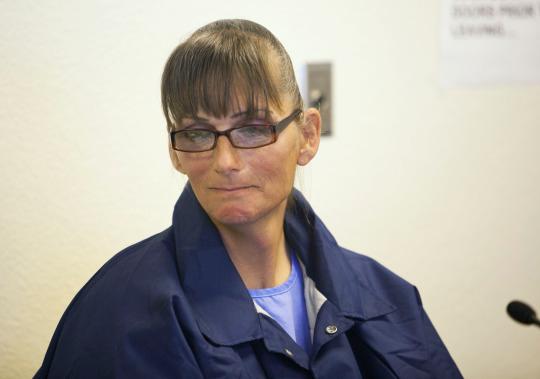
Inmate Michelle-Lael Norsworthy smiles after a parole hearing at Mule Creek State Prison in Ione, Calif. She is locked in a legal battle with The California Department of Corrections and Rehabilitation over her request for sex reassignment surgery. (Photo: Steve Yeater/AP)
The Supreme Court will announce whether it has found a fundamental right to same-sex marriage any day now, dramatically altering the course of gay rights history. But a much lower-profile case that is currently wending its way up through the federal courts could offer the Supreme Court an opportunity for another potentially transformative decision on LGBT rights as soon as next year.
The case — about whether the California state prison system should be required to pay for an inmate’s sex reassignment surgery — may change public perceptions about medical care for transgender people at a time when Caitlyn Jenner and other high-profile trans people are lending more visibility to the group.
The gay rights movement has been breathtakingly successful at changing public perceptions about gay people in the country in only a few decades, in part because of a well-organized legal campaign to win the right to gay marriage. One successful feature of the campaign: sympathetic plaintiffs. But the transgender movement has always lagged a bit behind. One reason is that while most Americans now say they know a gay person, the vast majority does not know a trans person. That is beginning to change, according to polling by advocacy group the Human Rights Campaign. Twenty-two percent of likely voters now say they know a transgender person, a five percentage point jump from even just one year earlier. And that’s already affecting public perceptions: 44 percent said in January that they viewed trans people favorably, compared to just 26 percent in 2011. A big Supreme Court case could do a lot to boost those numbers by bringing even more awareness of transgender people.
The law on transgender issues is something of a Wild West — very few states make clear that the government will recognize a person’s post-transition gender, for example, and some states have explicitly passed laws refusing to acknowledge a trans resident’s gender, even after sex reassignment surgeries. The Supreme Court has declined to wade into case after case affecting transgender people — including job discrimination cases. But this could all change soon.
In August, the U.S. Court of Appeals for the 9th Circuit Court will hear arguments in a case centering around Michelle-Lael Norsworthy, a 51-year-old who is serving time for second-degree murder at Mule Creek State Prison near Sacramento. She was diagnosed with gender dysphoria — the condition of feeling significant discomfort with the gender you were born as — and began taking female hormones in 2000. A physician assigned to her by the prison recommended Norsworthy for sex reassignment surgery, saying that the hormones and therapy were not enough to treat her gender dysphoria. Taking hormones long term could also lead to complications, because Norsworthy has hepatitis C, the physician said. Removing her male genitals would stop the production of male hormones and make taking female hormones unnecessary.
The California Department of Corrections and Rehabilitation denied Norsworthy’s claim, arguing that giving her expensive sex reassignment surgery would present security concerns. Male inmates might be more likely to assault her if she stayed in the men’s prison. (Norsworthy has already been raped six times while in prison, according to her lawyers, including a gang rape in 2009 during which she contracted hepatitis C.)